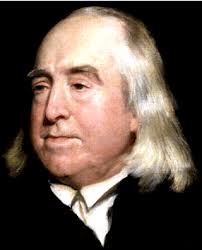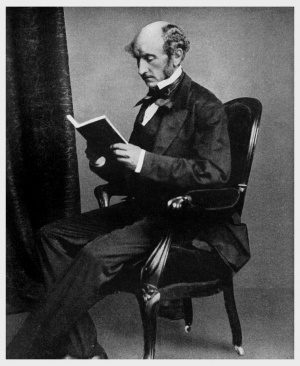Difference between revisions of "Utilitarian Philosophy"
(→Twentieth Century Utilitarian Philosophy) |
(→Twentieth Century Utilitarian Philosophy) |
||
| Line 4: | Line 4: | ||
A moral theory, utilitarianism focuses on the consequences of an action to determine if an act is morally correct rather than the intent of the one committing the action. Furthermore, it uses the "principle of utility" for this effort by suggesting that if the consequence results in a benefit for the "greater good", then the action is right. Utilitarianism also believes that no person's happiness holds higher precedence than that of their fellow human being. Due to the belief that what produces happiness or pleasure is the right act, it is often compared with Hedonism for its very similar views. Another way to think of utilitarianism, is that it is also a form of consequentialism. Like utilitarianism, consequentialism is an ethical theory that focuses on the result to lay judgement of the conduct. Based on this view, it supports the act, which produces good, as being morally correct. | A moral theory, utilitarianism focuses on the consequences of an action to determine if an act is morally correct rather than the intent of the one committing the action. Furthermore, it uses the "principle of utility" for this effort by suggesting that if the consequence results in a benefit for the "greater good", then the action is right. Utilitarianism also believes that no person's happiness holds higher precedence than that of their fellow human being. Due to the belief that what produces happiness or pleasure is the right act, it is often compared with Hedonism for its very similar views. Another way to think of utilitarianism, is that it is also a form of consequentialism. Like utilitarianism, consequentialism is an ethical theory that focuses on the result to lay judgement of the conduct. Based on this view, it supports the act, which produces good, as being morally correct. | ||
| − | + | In the past two centuries, numerous variants of Bentham's original form of Utilitarianism have emerged. Each unique form aims to answer the practical question of how one should live their life in order to achieve the highest ethical good. | |
==Act and Rule Utilitarianism== | ==Act and Rule Utilitarianism== | ||
Revision as of 08:11, 11 April 2019
Utilitarian philosophy or "utilitarianism" is a form of consequentialism [1] that focuses on the outcome of an action as a means of understanding the moral quality of that action. According to utilitarianism, in order to discern whether an action is morally right or wrong, you must first discover its "maximum utility" or potential to improve overall well-being, pleasure, or happiness among all forces which are directly affected by that action. An early proponent of Utilitarianism, Jeremy Bentham, referred to this belief as the "greatest happiness principle".
Contents
Twentieth Century Utilitarian Philosophy
A moral theory, utilitarianism focuses on the consequences of an action to determine if an act is morally correct rather than the intent of the one committing the action. Furthermore, it uses the "principle of utility" for this effort by suggesting that if the consequence results in a benefit for the "greater good", then the action is right. Utilitarianism also believes that no person's happiness holds higher precedence than that of their fellow human being. Due to the belief that what produces happiness or pleasure is the right act, it is often compared with Hedonism for its very similar views. Another way to think of utilitarianism, is that it is also a form of consequentialism. Like utilitarianism, consequentialism is an ethical theory that focuses on the result to lay judgement of the conduct. Based on this view, it supports the act, which produces good, as being morally correct.
In the past two centuries, numerous variants of Bentham's original form of Utilitarianism have emerged. Each unique form aims to answer the practical question of how one should live their life in order to achieve the highest ethical good.
Act and Rule Utilitarianism
There are two types of utilitarianism, act and rule utilitarianism. Act utilitarianism, or classical utilitarianism suggests that in any given situation, you should choose the action that produces the greatest good for the greater number. In the same vein, rule utilitarianism suggests that we ought to live by rules that produces the greatest good for the greater good.
Ideal Utilitarianism
First introduced by Hastings Rashdall in his most famous 1907 work "The Theory of Good and Evil" and later followed up by G.E. Moore in his 1912 work "Ethics", ideal utilitarianism rejects the black and white or hedonistic view of Bentham's early form of utilitarianism.
Preference Utilitarianism
John Harsanyi
Motive Utilitarianism
Negative Utilitarianism
Classical Utilitarians
"The Classical Utilitarians, Jeremy Bentham and John Stuart Mill, identified the good with pleasure, so, like Epicurus, were hedonists about value. They also held that we ought to maximize the good, that is, bring about ‘the greatest amount of good for the greatest number’." [1]Both were contemporaries of each other and it was the younger Mill whom would be taught by Bentham after he was approached by Mill's father. James Mill, was a very prominent man in his time and it was through the political circles that he befriend Bentham.
Jeremy Bentham
"Jeremy Bentham was an English philosopher and political radical. He is primarily known today for his moral philosophy, especially his principle of utilitarianism, which evaluates actions based upon their consequences. The relevant consequences, in particular, are the overall happiness created for everyone affected by the action. Influenced by many enlightenment thinkers, especially empiricists such as John Locke and David Hume, Bentham developed an ethical theory grounded in a largely empiricist account of human nature. He famously held a hedonistic account of both motivation and value according to which what is fundamentally valuable and what ultimately motivates us is pleasure and pain. Happiness, according to Bentham, is thus a matter of experiencing pleasure and lack of pain." [2]
Bentham and the "Philosophic Radicals"
No, this is not a precursor to the British Invasion of rock bands, but instead a group of you guessed it, radical thinkers. Led by Bentham and James Mill, the father of his future star pupil, John Stuart Mill, the group included David Ricardo, George Grote, Sir William Molesworth, John Austin, and Francis Place.
Both Bentham and the elder Mill, led this group in the name of political reform, believing that the current system under which the country was under was antiquated. Many of their beliefs was universal male suffrage, economic policy that was not favorable to the aristocrats
John Stuart Mill
"John Stuart Mill (1806-1873) profoundly influenced the shape of nineteenth century British thought and political discourse. His substantial corpus of works includes texts in logic, epistemology, economics, social and political philosophy, ethics, metaphysics, religion, and current affairs. Among his most well-known and significant are A System of Logic, Principles of Political Economy, On Liberty, Utilitarianism, The Subjection of Women, Three Essays on Religion, and his Autobiography.Mill’s education at the hands of his imposing father, James Mill, fostered both intellectual development (Greek at the age of three, Latin at eight) and a propensity towards reform. James Mill and Jeremy Bentham led the “Philosophic Radicals,” who advocated for rationalization of the law and legal institutions, universal male suffrage, the use of economic theory in political decision-making, and a politics oriented by human happiness rather than natural rights or conservatism. In his twenties, the younger Mill felt the influence of historicism, French social thought, and Romanticism, in the form of thinkers like Coleridge, the St. Simonians, Thomas Carlyle, Goethe, and Wordsworth. This led him to begin searching for a new philosophic radicalism that would be more sensitive to the limits on reform imposed by culture and history and would emphasize the cultivation of our humanity, including the cultivation of dispositions of feeling and imagination (something he thought had been lacking in his own education)." [3]
Ethical Issues
The Trolley Problem
This is the perfect example of our moral theory. As it is commonly referred to The Trolley problem is a theoretical quandary where you are in a position to prevent a tragedy, but you have to decided between allowing this runaway trolley hit one or five people. Since you are near a lever, which can alter the path of the aforementioned trolley, you can either do so so that it only hits one person on the track or the five people. < ref name = “Trolley Problem” > [2] </ref>
So what do you do? This is where utilitarian philosophy can be applied. Having learned that the morally right action is to do what benefits the greater good, then surely switching the lever to alter its course towards the poor, lone soul is what you ought to do, right? Well, herein lies the issue with utilitarian philosophy? How can we measure the happiness of this individual and why does the happiness of five people outweigh one? How can we quantify a measure that is arguably very subjective? If we knew more about each individual and what they could possibly do in this world, does that make us vulnerable to any biases we may have?
I believe this is core issue with utilitarian philosophy, because it allows us to solve theoretical issues like this, but can this actually be applied in a real-world case?
References
- ↑ Driver, Julia, "The History of Utilitarianism", The Stanford Encyclopedia of Philosophy (Winter 2014 Edition), Edward N. Zalta (ed.), URL = <https://plato.stanford.edu/archives/win2014/entries/utilitarianism-history/>.
- ↑ Sweet, William Internet Encyclopedia of Philosophy https://www.iep.utm.edu/bentham/
- ↑ Colin Heydt, Internet Encyclopedia of Philosophy, https://www.iep.utm.edu/milljs/

